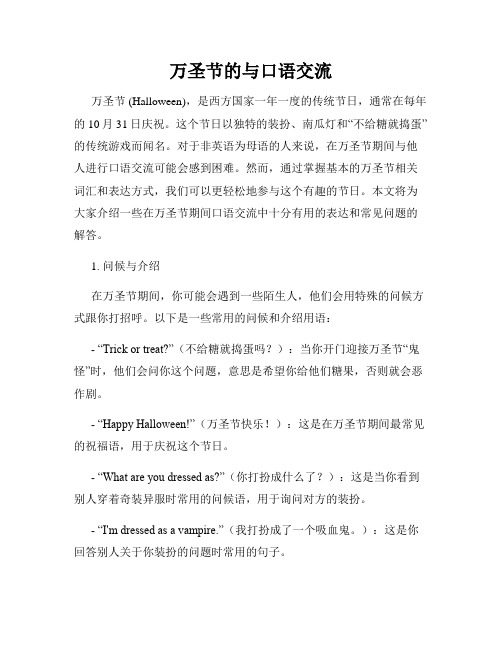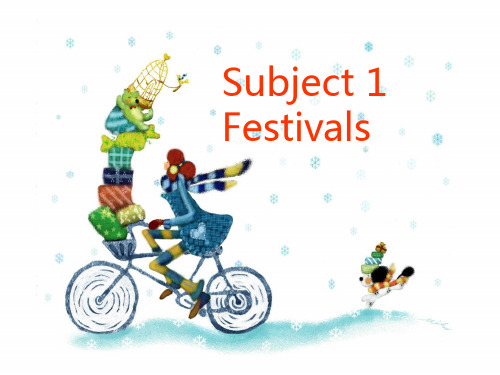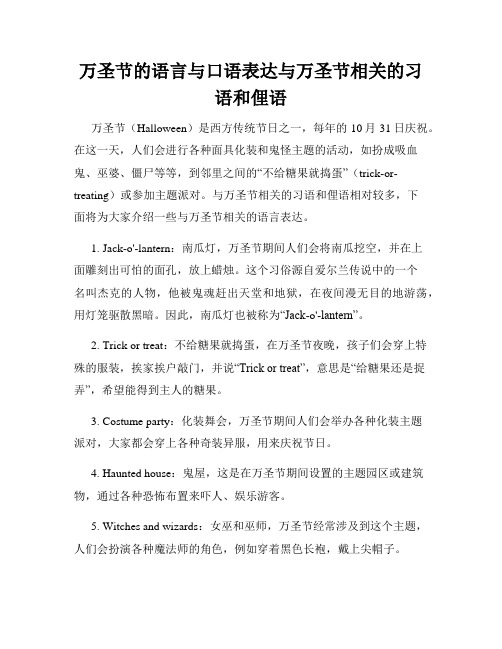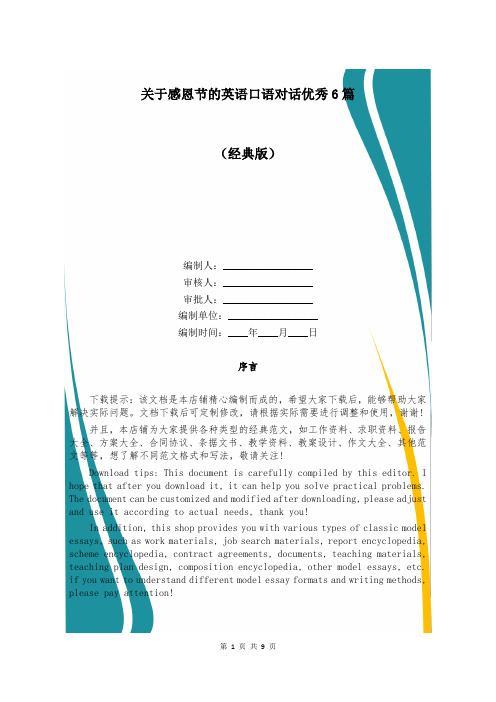口语话题中西方节日
如何在英语教学中渗透中西方传统节日

中学教育2019 年 1 月137如何在英语教学中渗透中西方传统节日许芳芳(江西省寻乌中学 江西寻乌 342200)摘 要:众所周知,每一个不同的民族都有着其特定的名族文化,而国家特定的节日是名族文化的重大组成部分。
在英语教学中,将西方节日与中国传统节日加以融合,能够创造出一种符合生活实际、响应时代发展的语言氛围,让学生们在真实的英语情景下了解西方国家的文化差异、习俗差异、英语用法差异等等,促进中西方文化的交流。
鉴于此,本文从多个角度谈谈如何在初中英语教学中有效渗透中西方传统节日,以促进中西方文化的结合,从而优化英语教学。
关键词:初中英语 中西方文化 传统节日 教学策略中国,作为有着五千年的深远的历史的国家,其传统文化博大精深、渊源流长。
中国传统节日是中国传统文化的重大组成部分,与此相同,西方节日也是西方文化的特征表现。
由于语言的学习离不开对传统文化的研究,因此,英语教师应当在教学过程中有效注入中西方文化,通过中西方文化的结合来实施和优化英语教学,促进英语教学的效率及成效。
一、初中英语教学中中西方文化结合的必要性通过《义务教育英语课程标准》,表明对传统文化的讲解指的是了解语言国家的地理位置、风俗习惯、价值观、思维方式等等。
在英语的实践和使用过程之中,英语的表达方式不同离不开英语学习者所处的社会环境、文化氛围[1]。
例如,通常而言,在海外学习的中国学者比国内的英语学习者的语文口语水平、英语表达能力水平高出很多。
由此可见,教师不仅要在英语教学中传授给学生一定的英语知识、英语概念和英语技能,还应当适当地加强对国家文化知识的传授和教学。
简而言之,英语的教育教学,离不开一定的国家文化的渗入。
由此可见,对于初中英语的教学而言,倘若教师能够在教学过程中从有效注入西方文化入手,势必能够让初中生更加深入地了解英语这一门语言学科的乐趣与魅力,并同时结合中国传统文化,对比中西方传统节日,使得学生在了解中西方文化差异的同时,提升对英语的学习欲望和探索动力,促进对初中生的文化素养的培养,并在一定程度上扩大了英语的学习内容和学习视野,有效地促进教师教学成效的提高。
万圣节的与口语交流

万圣节的与口语交流万圣节 (Halloween),是西方国家一年一度的传统节日,通常在每年的10月31日庆祝。
这个节日以独特的装扮、南瓜灯和“不给糖就捣蛋”的传统游戏而闻名。
对于非英语为母语的人来说,在万圣节期间与他人进行口语交流可能会感到困难。
然而,通过掌握基本的万圣节相关词汇和表达方式,我们可以更轻松地参与这个有趣的节日。
本文将为大家介绍一些在万圣节期间口语交流中十分有用的表达和常见问题的解答。
1. 问候与介绍在万圣节期间,你可能会遇到一些陌生人,他们会用特殊的问候方式跟你打招呼。
以下是一些常用的问候和介绍用语:- “Trick or treat?”(不给糖就捣蛋吗?):当你开门迎接万圣节“鬼怪”时,他们会问你这个问题,意思是希望你给他们糖果,否则就会恶作剧。
- “Happy Halloween!”(万圣节快乐!):这是在万圣节期间最常见的祝福语,用于庆祝这个节日。
- “What are you dressed as?”(你打扮成什么了?):这是当你看到别人穿着奇装异服时常用的问候语,用于询问对方的装扮。
- “I'm dressed as a vampire.”(我打扮成了一个吸血鬼。
):这是你回答别人关于你装扮的问题时常用的句子。
2. 万圣节装扮万圣节的一个重要部分就是穿上各种各样的装扮,扮成各种各样的角色。
以下是一些常见的装扮和相关表达方式:- Witch(女巫): A witch costume usually consists of a black hat, a black dress, and a broomstick.(女巫的装扮通常包括一顶黑色的帽子、一条黑色的裙子和一把扫帚。
)- Vampire(吸血鬼): A vampire costume often includes a black cape, fake fangs, and pale makeup.(吸血鬼的装扮通常包括一件黑色的斗篷、假的尖牙和苍白的妆容。
31口语5级中西方传统节日英文介绍

from parents and grandparents. And burning fireworks are the most typical custom. Both children and adults like to set off firecrackers(放鞭炮) of all kinds.
What do people do and eat on New Year‘s Day (What are the customs ?)
5
On New Year‘s Day, everybody dresses up(打扮). People say ―Happy New Year‖(表达问候) to each other. And children will get lucky money(压岁钱)
On the morning of New Year‘s Day, Northern Chinese (北方人)will eat jiaozi, for breakfast, because ―jiaozi‖ in sound means ―farewell (goodbye) to the old year and start in the new‖. And Southern Chinese(南方人) eat ―niangao‖ because in sound it means ―higher and higher, one year after another.‖
2.When
is Spring Festival?
The Spring Festival falls on the1st day of the 1st lunar (阴历的) month, and will last (持续)till the middle of the 1st lunar month (正月) of the next year. Of them, the most important days are Spring Festival Eve(除夕) and the first three days of the new year.
万圣节的语言与口语表达与万圣节相关的习语和俚语

万圣节的语言与口语表达与万圣节相关的习语和俚语万圣节(Halloween)是西方传统节日之一,每年的10月31日庆祝。
在这一天,人们会进行各种面具化装和鬼怪主题的活动,如扮成吸血鬼、巫婆、僵尸等等,到邻里之间的“不给糖果就捣蛋”(trick-or-treating)或参加主题派对。
与万圣节相关的习语和俚语相对较多,下面将为大家介绍一些与万圣节相关的语言表达。
1. Jack-o'-lantern:南瓜灯,万圣节期间人们会将南瓜挖空,并在上面雕刻出可怕的面孔,放上蜡烛。
这个习俗源自爱尔兰传说中的一个名叫杰克的人物,他被鬼魂赶出天堂和地狱,在夜间漫无目的地游荡,用灯笼驱散黑暗。
因此,南瓜灯也被称为“Jack-o'-lantern”。
2. Trick or treat:不给糖果就捣蛋,在万圣节夜晚,孩子们会穿上特殊的服装,挨家挨户敲门,并说“Trick or treat”,意思是“给糖果还是捉弄”,希望能得到主人的糖果。
3. Costume party:化装舞会,万圣节期间人们会举办各种化装主题派对,大家都会穿上各种奇装异服,用来庆祝节日。
4. Haunted house:鬼屋,这是在万圣节期间设置的主题园区或建筑物,通过各种恐怖布置来吓人、娱乐游客。
5. Witches and wizards:女巫和巫师,万圣节经常涉及到这个主题,人们会扮演各种魔法师的角色,例如穿着黑色长袍,戴上尖帽子。
6. Ghost stories:鬼故事,在万圣节的夜晚,人们会聚在一起分享各种吓人的鬼故事,增加节日气氛。
7. Skeletons and skulls:骷髅和头骨,这些象征死亡和恐怖的图案和装饰品通常会用来装饰万圣节的场所。
8. Candy corn:糖果玉米,这是一种特别与万圣节相关的糖果,呈金黄色,外形有点像玉米。
9. Spooky:可怕的,鬼魂的,万圣节期间人们常用这个词来形容各种恐怖的气氛和场景。
英语对话:中西方传统节日

英语口语对话介绍中西方传统节日role playrecent study?B: Hi, A….There’s some difficult for me. What a boring thing! Do you have any good suggestions?A: well, some of my foreign friends used to learn Chinese through chinese customs learning. As you know our language is closely related to our customs. Maybe it is a good way.B: Sounds like efficiently. Last week, two students gave their mini talk in my Chinese lesson, their topic are all about Mid-autumn Day accidently. They show us about mooncakes, dragon boats and lantern, so many things I haven’t heard before.August, Chinese calendar. Mooncakes are to Mid-Autumn Festival what mince pies are to Christmas. The seasonal round cakes traditionally have a sweet filling of lotus seed paste or red bean paste and often have one or more salted duck eggs in the center to represent the moon and the miss. And the moon is what this celebration is all abouton that day the moon is said to be at its brightest and fullest. the northern people like to eat five kernel moon cakes while people in west area don’t like it.There are 2 legends related to this festival.B: which two?B: You are too naughty! Then, what people usually do on the other two festivals?A: the theme must be eating and get together in nowadays .but , The Dragon Boat Festival is to commemorate qu yuan while The Lantern Festival is to welcome the New Year.so what’s your favourite festivals?B: Haha, my favorite festivals must be Halloween! It’s coming on the night of the last day of this month.Spooky, kooky, creepy, and fun! Halloween is the time of Ghosts and Witches .A: Why are there so many pumpkins in stores and supermarkets at the moment,what are these pumpkins for?B: Well, pumpkins are a symbol of Halloween called Jack-O-Lantern. That was carved like a spooky face and I’ll put a candle inside to light it up.A: There must be many other activities interested you, am I right?B:Bingo!Halloween is one of the oldest holidays. Traditional activities include trick-or -treating, bonfires, costume partie ually, I don’t like putting on make-up but I like dressing up scarily.A:I’ve learned trick-or-treating before. But I can’t understand the meaning of the word, maybe something special?B: Trick-or-treating, Yeah. We go in the streets, round where I live, knock on doors and get loads of sweets. Candy means good luck this year.A: So interesting! It should be boring if there’s nothing delicious at Halloween.B: For the costume party, Candy Corn, Jelly Apples, Pumpkins and Bats are necessary. Will you take part in my party? I have been preparing for it after the National Day.A: Of couse, really looking forward to.。
西方传统节日英文介绍

西方传统节日英文介绍,中英对照节日简介了解西方文化的时候,无论是通过网络或者书籍,我们都习惯看中文译本。
其实一门语言一旦被翻译,很多意思都会产生偏差,真正想了解一个东西,最好是通过原文来理解。
西方节日在中国传播发展,关于西方节日的介绍大家有没有了解呢?下面,一起来看看中英文对照版本的西方节日介绍,是不是跟你所知道的一样呢?1、复活节EasterEaster is a time of springtime festivals. In Christian countries Easter is celebrated as the religious holiday commemorating the resurrection of Jesus Christ, the son of God. But the celebrations of Easter have many customs and legends that are pagan in origin and have nothing to do with Christianity.Traditions associated with the festival survive in the Easter rabbit, a symbol of fertility, and in colored Easter eggs, originally painted with bright colors to represent the sunlight of spring, and used in Easter-egg rolling contests or given as gifts.复活节是春季的节日。
在信基督教的国家里,复活节是为纪念基督耶稣的复活而举行的宗教节日。
但是复活节有许多习俗和传说的由来都是非宗教的,它们与基督教没有任何关系。
与节日密切联系的一些传统有象复活节的野兔,它是作为繁殖生长的象征;还有复活节的彩蛋。
(部编版)统编六年级语文下册口语交际专项练习(含答案)

(部编版)统编六年级语文下册口语交际专项练习(含答案)部编版六年级语文下册口语交际归类第一单元的主题:节日大家谈五千年的斗转星移孕育出了博大精深的中华文化,历史的背影虽已渐行渐远,但中华民族的传统文化却传承至今,散发着永恒的魅力。
作为传统文化的重要组成部分,传统节日被保留到现在。
它是我们中华民族悠久的历史文化的一个组成部分。
从这些传承至今的民世俗民风节日里,清晰地记录着中华民族的丰富而多彩的社会生活文化内容。
我国的传统节日有春节、端午节、中秋节、重阳节等,大家熟知的西方节日有母亲节、感恩节、圣诞节等。
在这些节日中,你最喜欢哪个节日?为什么?请大家进行讨论,各抒己见。
第二单元的主题:我最喜欢的一本外国名著一部名著,蕴涵着丰富的知识和美好的情感。
阅读一部名著,仿佛跨越时间和空间,同睿智和高尚的人对话,这是多么美妙的事情呀!外国名著是浩瀚书海中美丽的浪花,其中的经典作品,源远流长、博大精深,是世界文化的瑰宝。
阅读外国名著,不仅有助于我们积累、理解和运用语言文字,而且有助于培养自主研究的良好惯,还有助于形成良好的道德品质和健全的人格。
例如,研究了本单元,我们从几部名著中认识了勇敢、执着的XXX,和小男孩XXX一起经历了神奇的旅程;跟随XXX独自探险……同学们,你还读过哪些外国名著?有哪些收获?今天,就让我们来交流一下吧!第三单元的主题:美好的一瞬间生活是个万花筒,有困难,有挫折,但带给我们最多的是美好。
美好的一瞬间往往就蕴含在我们的研究和生活当中。
当我们接受别人善意的时候,当我们少年游历,感受“江山如此多娇”的时候,当我们在校园一隅听到琅琅读书声的时候,当我们悄悄捡起草地上的垃圾的时候,当我们和小伙伴一起嬉戏打闹的时候,当我们享受着父母无微不至的关怀的时候,当我们和老师一起攻克困难堡垒的时候……我们总会感到生活的美好。
展示你的口才,再现那美好的一瞬间,诉说出你内心最真实的感觉吧!第四单元的主题:竞选发言同学们肯定听过这句话:“不想当将军的士兵不是好士兵。
关于感恩节的英语口语对话优秀6篇

关于感恩节的英语口语对话优秀6篇(经典版)编制人:__________________审核人:__________________审批人:__________________编制单位:__________________编制时间:____年____月____日序言下载提示:该文档是本店铺精心编制而成的,希望大家下载后,能够帮助大家解决实际问题。
文档下载后可定制修改,请根据实际需要进行调整和使用,谢谢!并且,本店铺为大家提供各种类型的经典范文,如工作资料、求职资料、报告大全、方案大全、合同协议、条据文书、教学资料、教案设计、作文大全、其他范文等等,想了解不同范文格式和写法,敬请关注!Download tips: This document is carefully compiled by this editor. I hope that after you download it, it can help you solve practical problems. The document can be customized and modified after downloading, please adjust and use it according to actual needs, thank you!In addition, this shop provides you with various types of classic model essays, such as work materials, job search materials, report encyclopedia, scheme encyclopedia, contract agreements, documents, teaching materials, teaching plan design, composition encyclopedia, other model essays, etc. if you want to understand different model essay formats and writing methods, please pay attention!关于感恩节的英语口语对话优秀6篇西方的感恩节,是中国人熟知的外国节日之一。
- 1、下载文档前请自行甄别文档内容的完整性,平台不提供额外的编辑、内容补充、找答案等附加服务。
- 2、"仅部分预览"的文档,不可在线预览部分如存在完整性等问题,可反馈申请退款(可完整预览的文档不适用该条件!)。
- 3、如文档侵犯您的权益,请联系客服反馈,我们会尽快为您处理(人工客服工作时间:9:00-18:30)。
What kind of festivals do you know including Chinese and western?
What is your favorite festival?
Why do you like it?
What do you usually do in that day?
How do your spend your birthday?
What birthday gift do your like most? What do you wish to receive in your last birthday?
中西方节日英文
春节:Spring Festival (the 1st day of the 1st lunar month)
除夕:New Year's Eve (the day before the Spring Festival)
元宵节:Lantern Festival (the 15th of the 1st lunar month)
清明节:Qingming / Tomb-Sweeping Festival (April 4th or 5th)
端午节:Dragon Boat Festival (the 5th of the 5th lunar month)
七夕节:Qixi Festival (the 7th day of the 7th month of the lunar month,
somewhat equivalent to Valentine's Day in English)
中秋节:Mid-Autumn Festival (the 15th of the 8th lunar month)
重阳节:Double-Ninth Day (the 9th of the 9th lunar
month
圣诞节:Christmas (the 25th of December)
平安夜:Christmas Eve (the 24th of December)
情人节:Valentine's Day (14th of February)
愚人节:Fool's Day (the 1st of April)
复活节:Easter (the 1st Sunday after a full moon on or after 21st of March)
感恩节:Thanksgiving Day (the 4th Thursday of November)
万圣节:Halloween / All Saints' Day (31st of October)。
